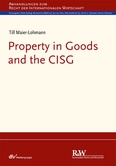I. Distinguishing different obligations to transfer the property
78
In the statement just cited,189 Rabel differentiates between the seller’s obligation to transfer the property and the seller’s liability for legal defects. This distinction goes back to his seminal work, “Das Recht des Warenkaufs”. In the section covering the seller’s main obligations, Rabel writes that there are multiple concurrent obligations of the seller. With regard to property, he cites two kinds of possible obligations:190 On the one hand, there can be an
1. Obligation to transfer unencumbered property
79
Rabel first addresses the obligation to make the buyer the owner of the goods. This obligation is breached if a third party has rights (for example, property under German or Swiss law) in the goods after the latter have been transferred to the buyer. It is not relevant whether third parties assert their right for there to be a breach of contract. One might refer to this kind of obligation as an obligation to transfer “perfect property/title”, an “obligation regarding third party rights”, or an “obligation to transfer unencumbered property” where “unencumbered” would signify the freedom from third party rights and claims. This work will use the last expression (“obligation to transfer unencumbered property”) following Rabel.191 This obligation differs from the obligation to merely guarantee undisturbed possession, since the latter is only breached if the buyer’s possession is disturbed. Yet, possession is not disturbed in case of the mere existence of a third party right, but rather when a third party claims to be entitled to the goods in any way.
2. Obligation to fulfill the necessary acts for the transfer of property
80
The obligation to transfer unencumbered property must be differentiated (but seldom was and is)192 from the obligation to fulfill the necessary acts for the transfer of property under property law. In the context of the latter obligation, it is not relevant whether third parties have rights in the goods or whether the seller had the authority to sell them. The obligation focuses on what the seller has to do in terms of formal acts to transfer property in contrast to whether the result of the buyer becoming the owner of the goods also vis-à-vis third parties is actually achieved. Using French terminology (which was employed during the drafting of the ULIS) this could be referred
81
A perfect illustration of how to differentiate these obligations can be found in the second draft of 1939 (the first draft containing a provision on both obligations) which bears the imprint of Rabel’s influence:
“Article 52. Le vendeur est obligé d’accomplir les actes qui sont nécessaires pour transférer à l’acheteur la propriété et la possession de la chose au sens de la loi nationale compétente.
Lorsque, par suite d’un vice affectant le droit du vendeur, ces actes ne peuvent pas procurer à l’acheteur la chose libre de tous droits appartenant à des tiers, l’acheteur, s’il ignorait ces droits en concluant le contrat, peut déclarer la résolution et demander, à raison de cette résolution, les dommages-intérêts prévus aux articles 87 à 91. [...]”195
82
The first sentence contains the obligation to fulfill the necessary acts for the transfer of property, while the second lays out the obligation to transfer unencumbered property and the respective remedies. This clear division was blurred in later drafts,196 but remains an important foundation for discussing and analyzing the obligations under the CISG. This is because the current opinions on how to interpret the CISG discussed below can be traced back to this differentiation.
| 189 | See above para. 75. |
| 190 | Rabel, Recht des Warenkaufs II, p. 313: “Es bestehen nebeneinander die Verpflichtungen [...] 2. den Akt vorzunehmen, der zur Übertragung des Eigentums sachenrechtlich vorgeschrieben ist, 3. a) das Eigentum an der Sache zu verschaffen, oder b) nur das geschützte Haben zu garantieren.” |
| 191 | See heading “2. Pflicht, freies Eigentum zu verschaffen”, Rabel, Recht des Warenkaufs II, p. 314. |
| 192 | Cf. also Rabel’s remark: “Man kann sagen, daß diese Verpflichtung selbstverständlich ist, obwohl sie oft verkannt, nämlich entweder übersehen oder fälschlich als Eigentumsverschaffungspflicht [im Sinne einer Pflicht, freies Eigentum zu verschaffen] angesehen wurde”, Rabel, Recht des Warenkaufs II, p. 315. |
| 193 | Cf. Tunc’s statements during the negotiations, Diplomatic Conference on the Unification of Law Governing the International Sale of Goods, The Hague, 2–25 April 1964, Vol. I – Records, p. 97. |
| 194 | See heading “3. Pflicht zur formellen Übereignung”, Rabel, Recht des Warenkaufs II, p. 314. |
| 195 | Rabel, Recht des Warenkaufs II, p. 404. |
| 196 | See more on the historic development of the provisions below paras. 255 et seq. |


